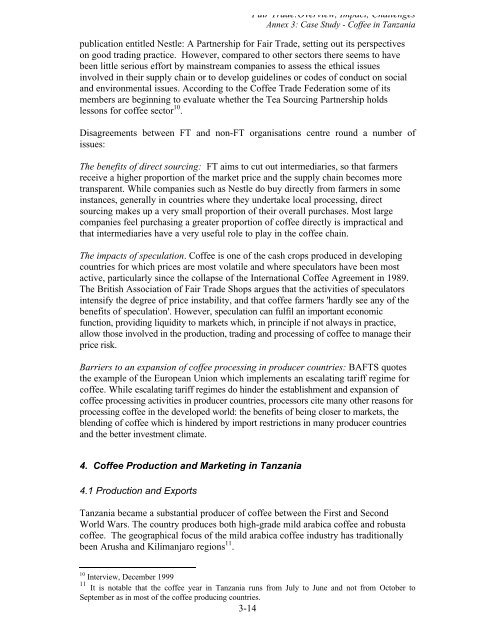Fair Trade: Overview, Impact, Challenges - Are you looking for one ...
Fair Trade: Overview, Impact, Challenges - Are you looking for one ...
Fair Trade: Overview, Impact, Challenges - Are you looking for one ...
Create successful ePaper yourself
Turn your PDF publications into a flip-book with our unique Google optimized e-Paper software.
<strong>Fair</strong> <strong>Trade</strong>:<strong>Overview</strong>, <strong>Impact</strong>, <strong>Challenges</strong><br />
Annex 3: Case Study - Coffee in Tanzania<br />
publication entitled Nestle: A Partnership <strong>for</strong> <strong>Fair</strong> <strong>Trade</strong>, setting out its perspectives<br />
on good trading practice. However, compared to other sectors there seems to have<br />
been little serious ef<strong>for</strong>t by mainstream companies to assess the ethical issues<br />
involved in their supply chain or to develop guidelines or codes of conduct on social<br />
and environmental issues. According to the Coffee <strong>Trade</strong> Federation some of its<br />
members are beginning to evaluate whether the Tea Sourcing Partnership holds<br />
lessons <strong>for</strong> coffee sector 10 .<br />
Disagreements between FT and non-FT organisations centre round a number of<br />
issues:<br />
The benefits of direct sourcing: FT aims to cut out intermediaries, so that farmers<br />
receive a higher proportion of the market price and the supply chain becomes more<br />
transparent. While companies such as Nestle do buy directly from farmers in some<br />
instances, generally in countries where they undertake local processing, direct<br />
sourcing makes up a very small proportion of their overall purchases. Most large<br />
companies feel purchasing a greater proportion of coffee directly is impractical and<br />
that intermediaries have a very useful role to play in the coffee chain.<br />
The impacts of speculation. Coffee is <strong>one</strong> of the cash crops produced in developing<br />
countries <strong>for</strong> which prices are most volatile and where speculators have been most<br />
active, particularly since the collapse of the International Coffee Agreement in 1989.<br />
The British Association of <strong>Fair</strong> <strong>Trade</strong> Shops argues that the activities of speculators<br />
intensify the degree of price instability, and that coffee farmers 'hardly see any of the<br />
benefits of speculation'. However, speculation can fulfil an important economic<br />
function, providing liquidity to markets which, in principle if not always in practice,<br />
allow those involved in the production, trading and processing of coffee to manage their<br />
price risk.<br />
Barriers to an expansion of coffee processing in producer countries: BAFTS quotes<br />
the example of the European Union which implements an escalating tariff regime <strong>for</strong><br />
coffee. While escalating tariff regimes do hinder the establishment and expansion of<br />
coffee processing activities in producer countries, processors cite many other reasons <strong>for</strong><br />
processing coffee in the developed world: the benefits of being closer to markets, the<br />
blending of coffee which is hindered by import restrictions in many producer countries<br />
and the better investment climate.<br />
4. Coffee Production and Marketing in Tanzania<br />
4.1 Production and Exports<br />
Tanzania became a substantial producer of coffee between the First and Second<br />
World Wars. The country produces both high-grade mild arabica coffee and robusta<br />
coffee. The geographical focus of the mild arabica coffee industry has traditionally<br />
been Arusha and Kilimanjaro regions 11 .<br />
10<br />
Interview, December 1999<br />
11<br />
It is notable that the coffee year in Tanzania runs from July to June and not from October to<br />
September as in most of the coffee producing countries.<br />
3-14
















![CynefinFramework final [Read-Only]](https://img.yumpu.com/19017304/1/190x135/cynefinframework-final-read-only.jpg?quality=85)